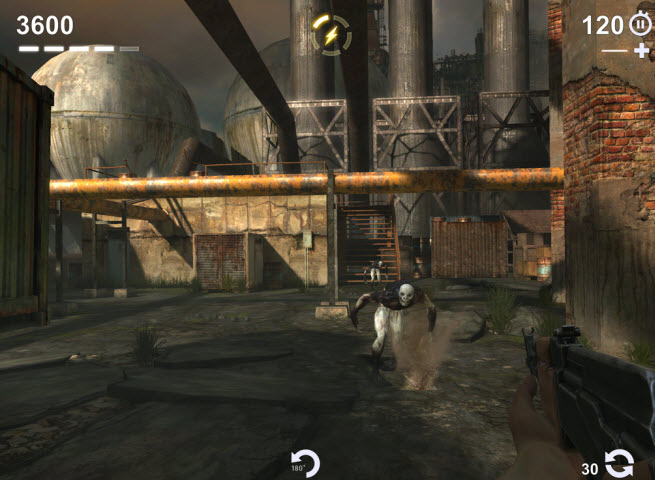GamesBeat: Do you see this as bringing console-game quality into the tablet? Did you start out with a different kind of vision for this?
Cousins: No, we always had a vision to bring high-end graphics and the kind of adult tone you get from a console game onto mobile. There’s a reason for this. There’s a lot of core gamers who have mobile devices, and you know what core gamers are like. They want to play on every device they have. But the kind of games that are available for them on mobile don’t really match their tastes. They don’t have the kind of game world and feel that they love. But also, the kind of core games that are available often have a premium price point. People playing games on mobile expect freemium nowadays. That’s the predominant model. So we always wanted to make high-end games, targeted at core gamers, on tablets and on phones, and with a freemium price point.
GamesBeat: Twenty people is still a smaller team than you might have on console.
Cousins: Yeah. For mobile it’s a big team and a big budget, but if you compare it to a console game, it’s much smaller. We’ll have much better profit margins, if we’re successful, than we would on a console game.
GamesBeat: Do you ever worry that you might be too early with this idea? That you should wait a while to make the leap?
Cousins: For a company with deep pockets like DeNA, there’s an advantage to being the first mover. Let’s just say we took great solace from the success of CSR Racing. They approached making a driving game in a similar way to how we approached a shooter. They created a game with a short game loop and compromised controls, but which had the feel of a console game. We felt like this was a much bigger risk before CSR Racing was a success. Maybe we are too early. I don’t know. We’ll see what consumers think. From a device point of view, we have the devices that can support these visuals and this gameplay.
GamesBeat: Most of the shooter games we’ve seen on tablets fall short. They try to do touch-screen controls that don’t work. The alternative has always been to plug a controller into the tablet. You didn’t like that idea either?
Cousins: I used to work at Sony, on the EyeToy team. One thing we saw is that as soon as you force people to buy a peripheral in order to play a game, you dramatically reduce your potential audience. It was clear from the start that we didn’t want to require some kind of controller. After a few weeks of experimentation, we realized that it was going to be possible to create a pretty good control system without a controller, so we feel pretty confident.
A lot of the shooters on mobile make a few mistakes. First of all, they use the virtual stick system, which has proven not to work. They have a premium price point, which doesn’t fit what people expect on mobile anymore. Their game loop is very long. They expect you to sit down and play the game like you would on console, where you play for several hours at a time. They have these long, in-depth, scripted environments. We don’t see that as working so well as what we have. We’re trying to solve or improve on those three mistakes that usually get made by existing shooters on mobile.
GamesBeat: So the smaller arena — that seems like a solution to dealing with memory constraints.
Cousins: Exactly. Although these devices do have quite a bit of memory. We wanted to get really high-end visuals, and that’s easier to do in a smaller environment. Load times are shorter as well. You don’t need to deal with things like streaming. Also, if your game loop in its entirety is only three minutes, you don’t need to build this big environment.
GamesBeat: How much memory does it take up?
Cousins: We run on the devices with 512 megabytes of RAM.
GamesBeat: But you can’t, say, download it over the air?
Cousins: No, the download size is about 700MB. It’s not as big as the biggest games, which are about one to two gigabytes, but it’s much bigger than the average casual game. That’s because of the quality of the textures and so on.
GamesBeat: It’s not a problem if it’s a premium game, though. People will wait for the download.
Cousins: Yeah, if they’ve already spent money. … [Laughs] Exactly. That’s one of the big experiments that we’re exploring here. What happens if you have a very high-end freemium game? How does it change the consumer’s behavior?
GamesBeat: How long of an experience is it intended to be?
Cousins: It depends on how much you want to get out of the game. To unlock all of the weapons, probably 30 or 40 hours. To unlock and level up all the weapons, to get everything in the game, it could be hundreds of hours. By the time people get to that point, we’ll have already dropped in more content.
VentureBeat's mission is to be a digital town square for technical decision-makers to gain knowledge about transformative enterprise technology and transact. Learn More

